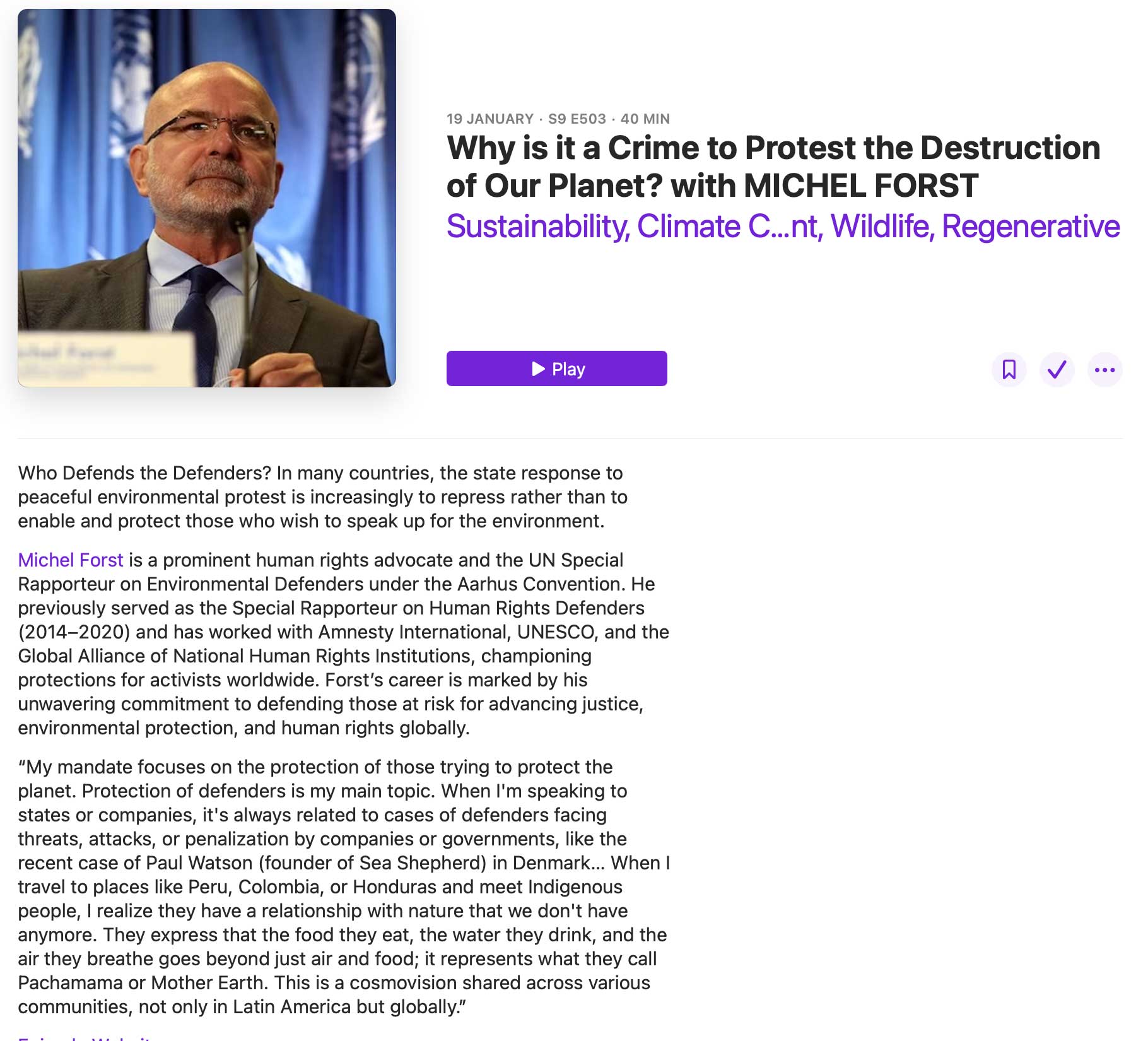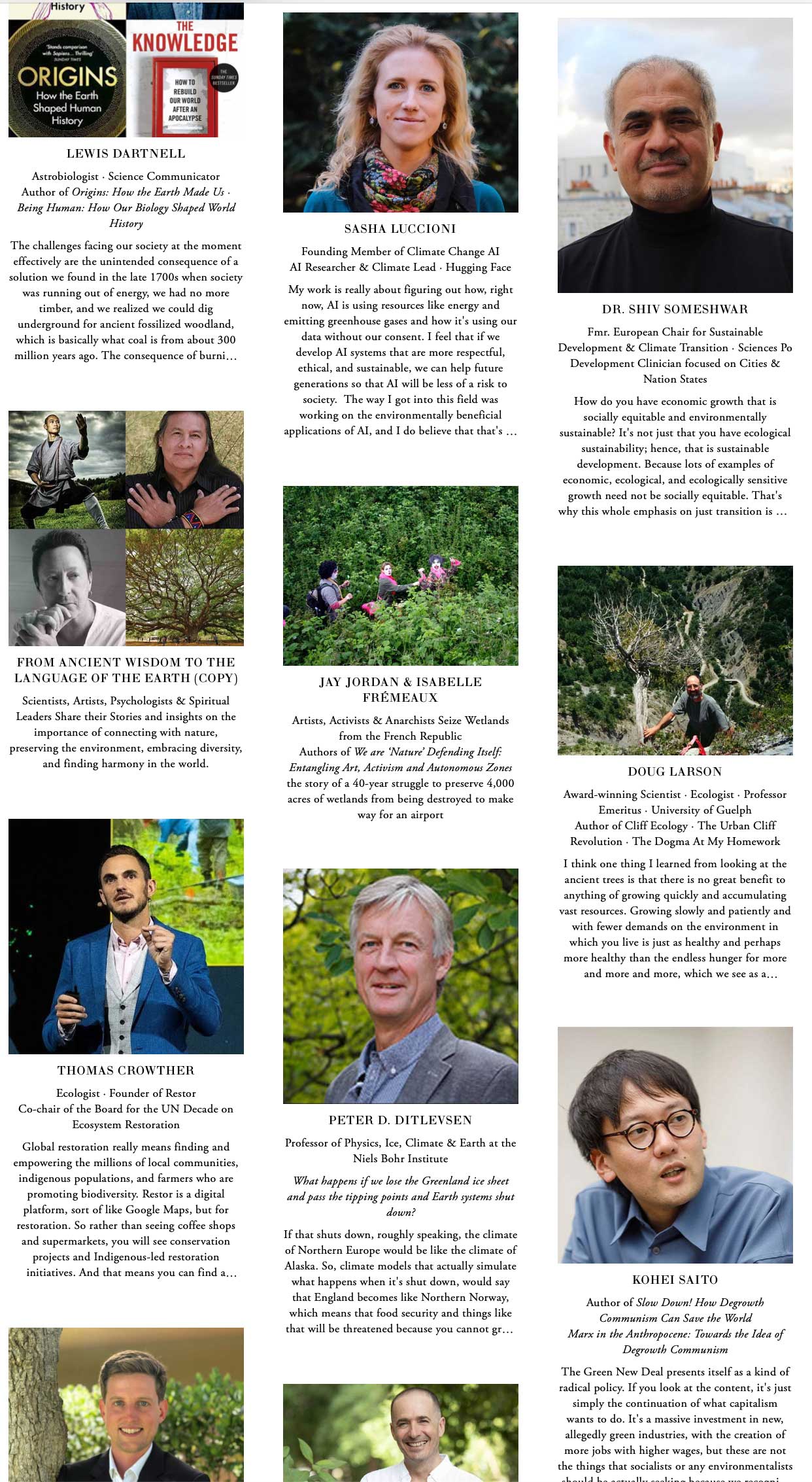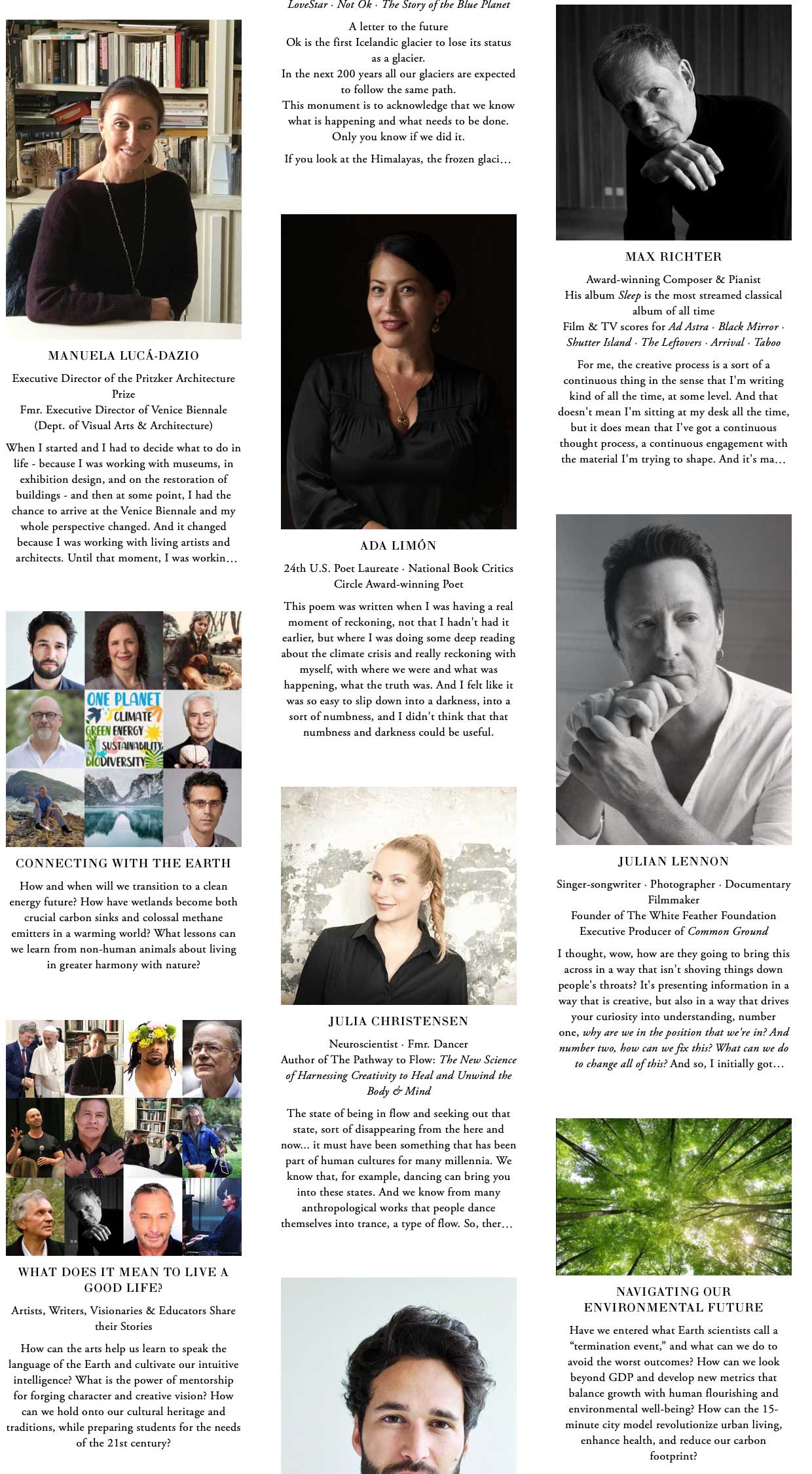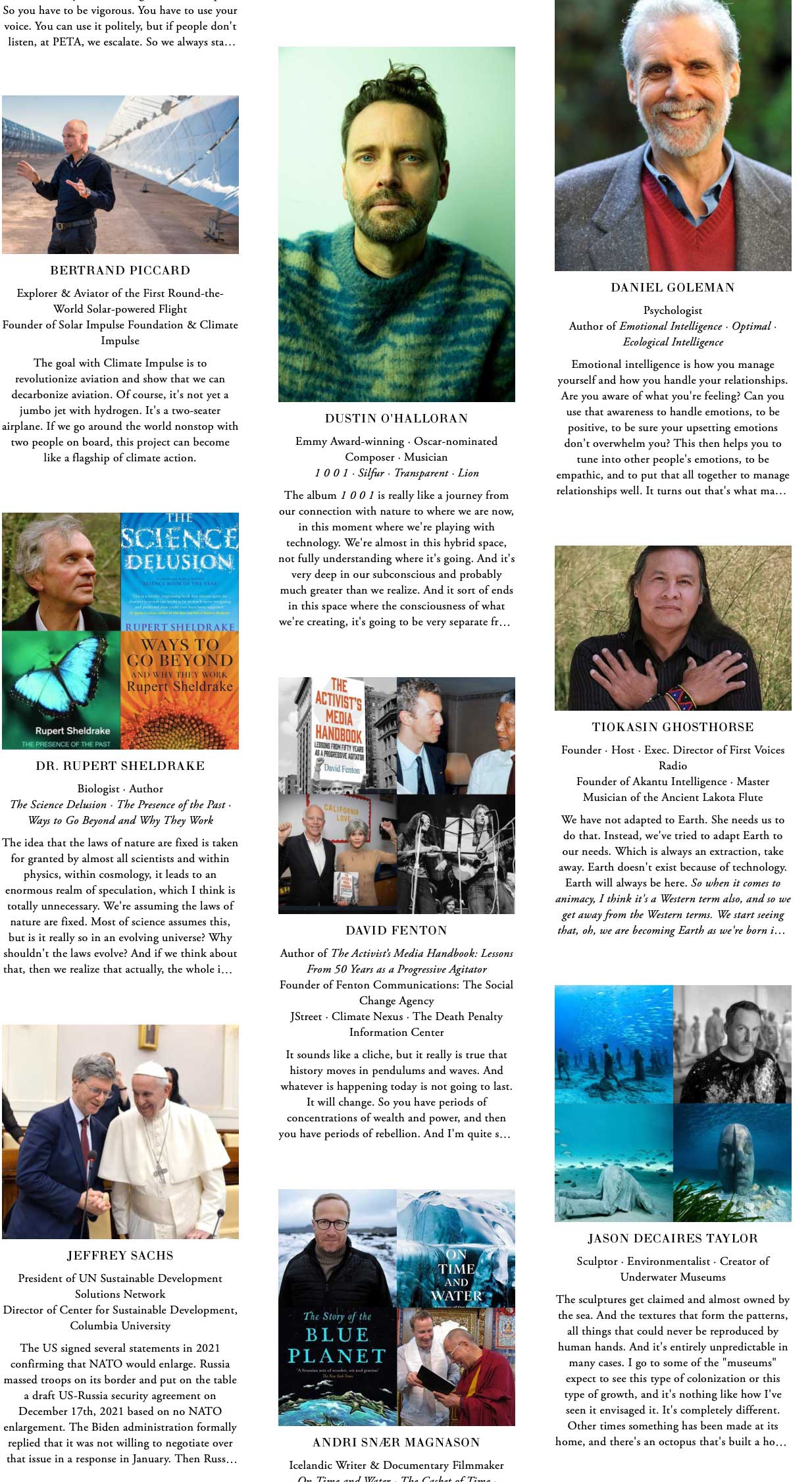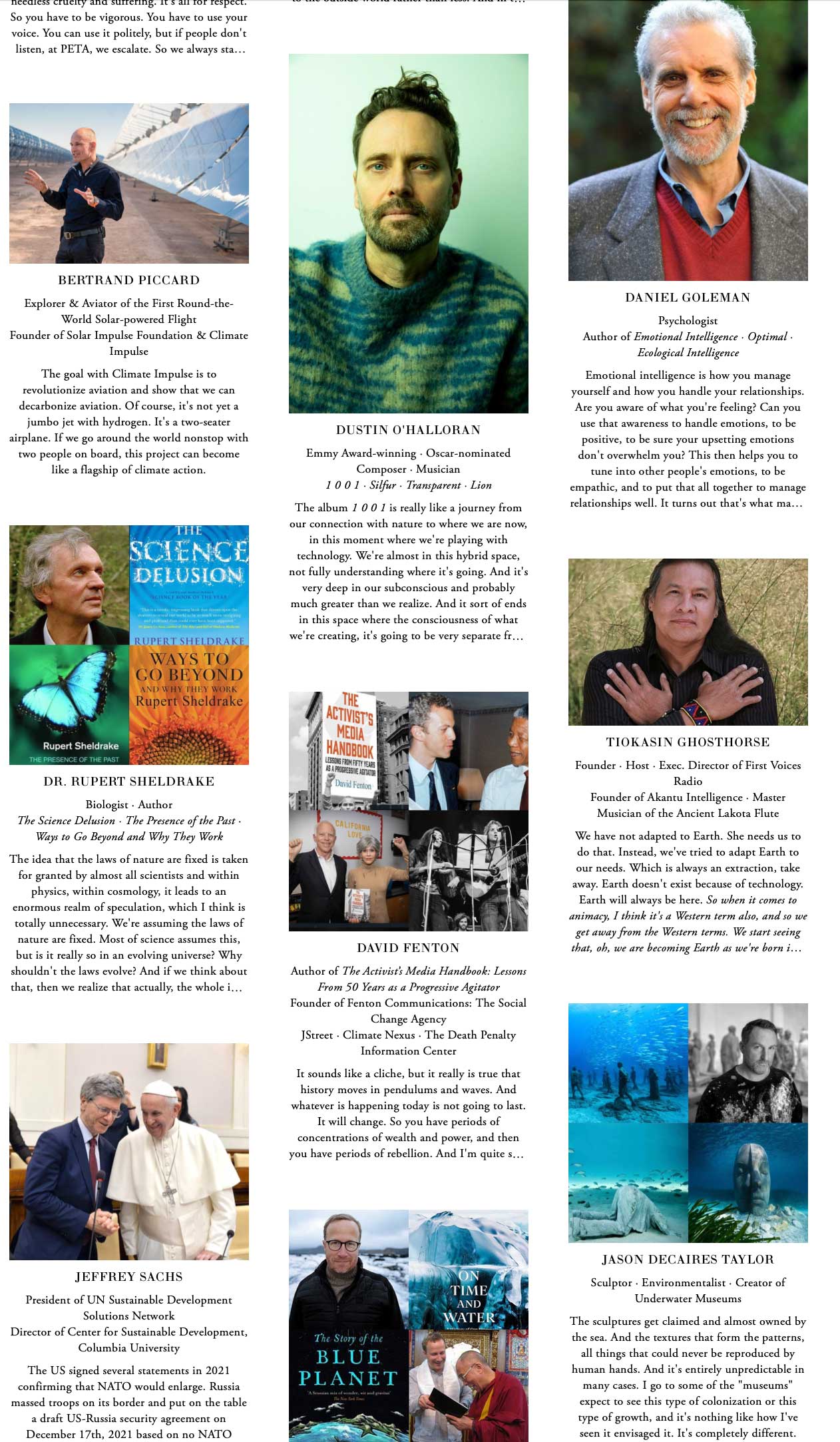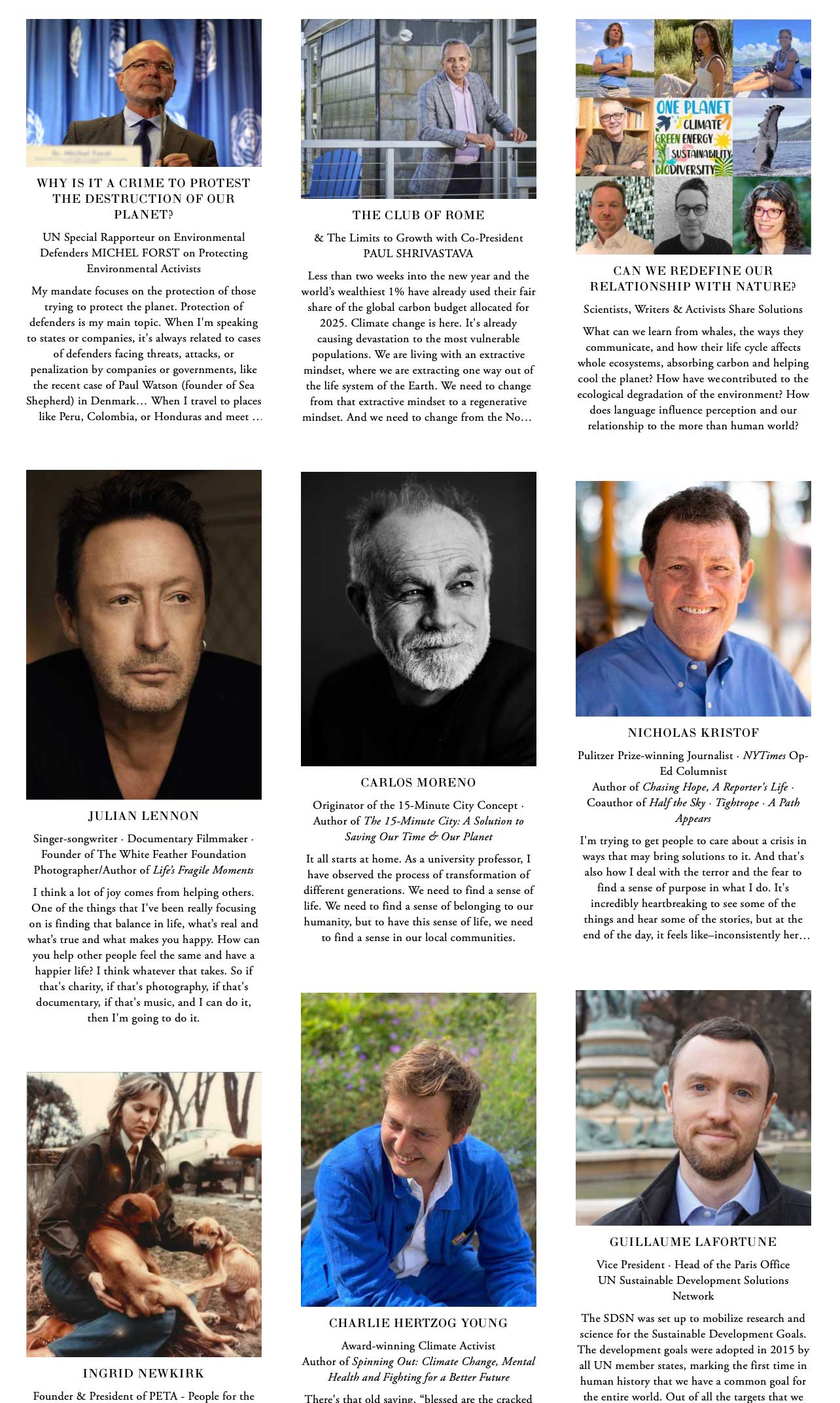Shaping a circular industrial ecosystem and supporting life-cycle thinking
Building Tomorrow Today: Podcast+
Building Tomorrow Today: Podcast & Educational Initiative
The circular economy exists in nature and must be adopted through education and outreach. One Planet Podcast and The Creative Process address low-waste, low-carbon, and sustainable design and infrastructure challenges. Their new initiative, Building Tomorrow Today, will produce 100 episodes over two years, co-hosted by students and experts. The series highlights eco-innovation across Europe, featuring Paula Pinho, Walter Stahel, Bertrand Piccard, European Commission, UN, and thought leaders.
France
Regional
Europe
It addresses urban-rural linkages
It refers to other types of transformations (soft investment)
Yes
2025-01-01
No
No
No
As an individual
The circular economy has existed in nature for a long time. Nature's circularity is by evolution. To accelerate this shift in human society, One Planet Podcast and The Creative Process focus on raising awareness of three key challenges:
Reducing waste – Encouraging a shift from consumerism to mindful usage through incentives, waste prevention, and smart resource management.
Lowering carbon emissions – Promoting conservation of water, energy, and CO₂ while driving innovation in green electricity and circular energy.
Preserving infrastructure – Maintaining existing buildings, equipment, and materials to minimize environmental impact.
To inform and drive change, The Creative Process reaches millions monthly through its podcasts and intergenerational knowledge sharing platform, with over 1,600 episodes produced on environmental, educational, and cultural topics. Our loyal audience includes over 2 million listens a month, and over 3 million monthly reads.
The Building Tomorrow Today initiative extends this mission by engaging environmentally conscious students, professors, and experts across European universities. Over a two-year period, students help produce 100 podcast episodes exploring innovative design, sustainable materials, and circular economy solutions.
The series spotlights leading eco-architects, urban planners, environmentalists, and policymakers, showcasing real-world progress in sustainability. It begins with CSTB (Scientific and Technical Centre for Building) and other innovation hubs in Europe, including Sophia Antipolis—a thriving ecosystem of 2,500 companies valued at €5.6 billion, employing 38,000 people from 80+ nationalities. A model for The New European Bauhaus Initiative, Sophia Antipolis embodies innovation, ambition, and creativity, demonstrating how collaborative communities can shape a sustainable future.
These interviews are conducted with personal narrative storytelling, which is relatable and engaging content for audiences.
Reducing waste – Encouraging a shift from consumerism to mindful usage through incentives, waste prevention, and smart resource management.
Lowering carbon emissions – Promoting conservation of water, energy, and CO₂ while driving innovation in green electricity and circular energy.
Preserving infrastructure – Maintaining existing buildings, equipment, and materials to minimize environmental impact.
To inform and drive change, The Creative Process reaches millions monthly through its podcasts and intergenerational knowledge sharing platform, with over 1,600 episodes produced on environmental, educational, and cultural topics. Our loyal audience includes over 2 million listens a month, and over 3 million monthly reads.
The Building Tomorrow Today initiative extends this mission by engaging environmentally conscious students, professors, and experts across European universities. Over a two-year period, students help produce 100 podcast episodes exploring innovative design, sustainable materials, and circular economy solutions.
The series spotlights leading eco-architects, urban planners, environmentalists, and policymakers, showcasing real-world progress in sustainability. It begins with CSTB (Scientific and Technical Centre for Building) and other innovation hubs in Europe, including Sophia Antipolis—a thriving ecosystem of 2,500 companies valued at €5.6 billion, employing 38,000 people from 80+ nationalities. A model for The New European Bauhaus Initiative, Sophia Antipolis embodies innovation, ambition, and creativity, demonstrating how collaborative communities can shape a sustainable future.
These interviews are conducted with personal narrative storytelling, which is relatable and engaging content for audiences.
raising awareness
reducing waste
lowering carbon emissions
conservation
circular economy
One Planet Podcast and The Creative Process embody the New European Bauhaus (NEB) values by promoting sustainability, creativity, and inclusion through education and media.
Key Sustainability Objectives & Achievements
Advancing Sustainability – Featuring global experts on circular economy, climate action, and green innovation, influencing individuals, policymakers, and organizations.
Inspiring Through Storytelling – Using engaging narratives and design thinking to make sustainability accessible and actionable.
Empowering the Next Generation – The Building Tomorrow Today initiative partners with European universities, where students co-produce 100 episodes on sustainable solutions.
Showcasing Innovation – Highlighting eco-designers, urban planners, and green tech pioneers, fostering cross-disciplinary collaboration.
Driving Real-World Impact – Encouraging behavior change, corporate sustainability, and policy discussions through an audience of millions.
Why This Project is Exemplary
Global Reach & Scalability – Millions engage monthly with its digital content, spreading NEB values worldwide.
Interdisciplinary Collaboration – Uniting science, design, and community-driven innovation to shape a sustainable future.
Long-Term Commitment – Since 2016, continuously fostering awareness, engagement, and action in sustainability.
By amplifying changemakers and making sustainability an engaging, inclusive conversation, One Planet Podcast and The Creative Process serve as a leading example of how NEB’s vision can be brought to life.
Key Sustainability Objectives & Achievements
Advancing Sustainability – Featuring global experts on circular economy, climate action, and green innovation, influencing individuals, policymakers, and organizations.
Inspiring Through Storytelling – Using engaging narratives and design thinking to make sustainability accessible and actionable.
Empowering the Next Generation – The Building Tomorrow Today initiative partners with European universities, where students co-produce 100 episodes on sustainable solutions.
Showcasing Innovation – Highlighting eco-designers, urban planners, and green tech pioneers, fostering cross-disciplinary collaboration.
Driving Real-World Impact – Encouraging behavior change, corporate sustainability, and policy discussions through an audience of millions.
Why This Project is Exemplary
Global Reach & Scalability – Millions engage monthly with its digital content, spreading NEB values worldwide.
Interdisciplinary Collaboration – Uniting science, design, and community-driven innovation to shape a sustainable future.
Long-Term Commitment – Since 2016, continuously fostering awareness, engagement, and action in sustainability.
By amplifying changemakers and making sustainability an engaging, inclusive conversation, One Planet Podcast and The Creative Process serve as a leading example of how NEB’s vision can be brought to life.
Aesthetics & Quality of Experience in The Creative Process & One Planet Podcast
The Creative Process and One Planet Podcast are designed to inspire and educate through a rich, interdisciplinary experience that blends art, culture, and science, making sustainability and innovation more engaging for diverse audiences.
Key Objectives & Achievements
Inclusive & Engaging Design – The podcasts use storytelling, music, and immersive audio to create a compelling listening experience, making complex ideas accessible and enjoyable.
Interdisciplinary Approach – Featuring artists, scientists, designers, and thought leaders, they bridge disciplines to reach audiences regardless of their background or learning style.
Cultural Enrichment – Exploring the role of creativity in sustainability, they highlight how architecture, literature, and the arts shape our relationship with the environment.
Fun & Informal Learning – A conversational, narrative-driven format makes educational content digestible and engaging for the general public.
High Production Quality – Professional sound design, editing, and curated content ensure a polished, immersive experience.
Why This Project is Exemplary
Broad Appeal – The fusion of culture and science attracts a diverse audience, from students to professionals and lifelong learners.
Multi-Sensory Experience – Unlike traditional educational formats, the podcasts create an emotional and intellectual connection through artful storytelling.
Sustained Impact – With millions of listens and collaborations with universities, the project fosters long-term learning and inspiration.
By blending design, culture, and education, One Planet Podcast and The Creative Process set a new standard for how media can enhance public understanding and appreciation of sustainability.
The Creative Process and One Planet Podcast are designed to inspire and educate through a rich, interdisciplinary experience that blends art, culture, and science, making sustainability and innovation more engaging for diverse audiences.
Key Objectives & Achievements
Inclusive & Engaging Design – The podcasts use storytelling, music, and immersive audio to create a compelling listening experience, making complex ideas accessible and enjoyable.
Interdisciplinary Approach – Featuring artists, scientists, designers, and thought leaders, they bridge disciplines to reach audiences regardless of their background or learning style.
Cultural Enrichment – Exploring the role of creativity in sustainability, they highlight how architecture, literature, and the arts shape our relationship with the environment.
Fun & Informal Learning – A conversational, narrative-driven format makes educational content digestible and engaging for the general public.
High Production Quality – Professional sound design, editing, and curated content ensure a polished, immersive experience.
Why This Project is Exemplary
Broad Appeal – The fusion of culture and science attracts a diverse audience, from students to professionals and lifelong learners.
Multi-Sensory Experience – Unlike traditional educational formats, the podcasts create an emotional and intellectual connection through artful storytelling.
Sustained Impact – With millions of listens and collaborations with universities, the project fosters long-term learning and inspiration.
By blending design, culture, and education, One Planet Podcast and The Creative Process set a new standard for how media can enhance public understanding and appreciation of sustainability.
We prioritize inclusion by ensuring accessibility, affordability, and participation for all. These podcasts foster a broad, diverse dialogue about sustainability, culture, and innovation, using inclusive approaches that reflect new societal models and design principles for all.
Key Objectives & Achievements
Accessibility & Affordability – free and available globally, providing high-quality educational content without financial barriers. This open-access approach ensures that listeners from all backgrounds can benefit, regardless of location or income.
Inclusive Content – Featuring voices from diverse backgrounds, the podcasts showcase perspectives from marginalized communities, underrepresented groups, and global leaders in sustainability, making complex issues relatable to everyone.
Inclusive Collaboration –The podcasts bring together experts from varied fields—designers, activists, educators, scientists, artists—to foster a rich exchange of ideas, promoting the idea that sustainability is for all.
Global Reach –With millions of listeners worldwide and a proven track record of over 2 million monthly listens, One Planet Podcast and The Creative Process ensure that global issues and solutions are discussed with a wide audience, including those outside the traditional sustainability circle.
Global Ranking in the top 1% of podcasts - we’re an established, trusted source for education & discussion on sustainability & social innovation.
Why This Project is Exemplary
Global Impact –By reaching a global audience, the podcasts provide a platform for inclusive dialogue and diverse perspectives, amplifying voices that are often underrepresented.
Long-Term Engagement –The podcasts maintain a loyal, growing audience, ensuring access to inclusive, relevant content that adapts to global challenges.
Setting a New Standard –With our inclusive governing ethos, open access & commitment to broad-reaching impact, we exemplify the principles of inclusion in content & structure
Key Objectives & Achievements
Accessibility & Affordability – free and available globally, providing high-quality educational content without financial barriers. This open-access approach ensures that listeners from all backgrounds can benefit, regardless of location or income.
Inclusive Content – Featuring voices from diverse backgrounds, the podcasts showcase perspectives from marginalized communities, underrepresented groups, and global leaders in sustainability, making complex issues relatable to everyone.
Inclusive Collaboration –The podcasts bring together experts from varied fields—designers, activists, educators, scientists, artists—to foster a rich exchange of ideas, promoting the idea that sustainability is for all.
Global Reach –With millions of listeners worldwide and a proven track record of over 2 million monthly listens, One Planet Podcast and The Creative Process ensure that global issues and solutions are discussed with a wide audience, including those outside the traditional sustainability circle.
Global Ranking in the top 1% of podcasts - we’re an established, trusted source for education & discussion on sustainability & social innovation.
Why This Project is Exemplary
Global Impact –By reaching a global audience, the podcasts provide a platform for inclusive dialogue and diverse perspectives, amplifying voices that are often underrepresented.
Long-Term Engagement –The podcasts maintain a loyal, growing audience, ensuring access to inclusive, relevant content that adapts to global challenges.
Setting a New Standard –With our inclusive governing ethos, open access & commitment to broad-reaching impact, we exemplify the principles of inclusion in content & structure
Sustainability –The podcasts prioritize sustainability through their global reach, educating listeners about climate action, circular economy and innovation. By featuring diverse experts, they amplify sustainable practices across multiple sectors and encourage individuals to take action.
Aesthetics – The podcasts employ engaging storytelling, quality sound design and artistic content to make complex sustainability topics accessible and appealing. They highlight how culture, design and art intersect with environmental solutions, showing that beauty and sustainability can coexist.
Inclusivity – With a global audience and free access, the podcasts create an inclusive platform that welcomes all voices. They collaborate with diverse experts, educators and communities, promoting accessibility and broad participation in sustainability conversations.
Citizen & Civil Society Involvement
Unlike single-location projects, One Planet Podcast and The Creative Process use the podcast format to foster cross-pollination of ideas from around the world, ensuring diverse perspectives on global issues.
Citizen Participation –The podcasts encourage listeners from all backgrounds to engage by providing accessible, free content. Through social media and community engagement, listeners actively contribute ideas, share feedback and promote sustainable action in their communities.
Civil Society Engagement –The podcasts collaborate with universities, non-profits and social enterprises, involving experts and students in co-producing episodes on sustainability and innovation. This collaboration helps ground the content in real-world solutions and amplifies the voices of those at the grassroots level.
Impact –Involvement of citizens and civil society make the podcasts not just a source of information but a community-driven platform for change, where ideas are exchanged & acted upon across borders. Feedback from listeners shapes future content, creating a cycle of continuous learning action
Aesthetics – The podcasts employ engaging storytelling, quality sound design and artistic content to make complex sustainability topics accessible and appealing. They highlight how culture, design and art intersect with environmental solutions, showing that beauty and sustainability can coexist.
Inclusivity – With a global audience and free access, the podcasts create an inclusive platform that welcomes all voices. They collaborate with diverse experts, educators and communities, promoting accessibility and broad participation in sustainability conversations.
Citizen & Civil Society Involvement
Unlike single-location projects, One Planet Podcast and The Creative Process use the podcast format to foster cross-pollination of ideas from around the world, ensuring diverse perspectives on global issues.
Citizen Participation –The podcasts encourage listeners from all backgrounds to engage by providing accessible, free content. Through social media and community engagement, listeners actively contribute ideas, share feedback and promote sustainable action in their communities.
Civil Society Engagement –The podcasts collaborate with universities, non-profits and social enterprises, involving experts and students in co-producing episodes on sustainability and innovation. This collaboration helps ground the content in real-world solutions and amplifies the voices of those at the grassroots level.
Impact –Involvement of citizens and civil society make the podcasts not just a source of information but a community-driven platform for change, where ideas are exchanged & acted upon across borders. Feedback from listeners shapes future content, creating a cycle of continuous learning action
Stakeholder Engagement
Students – At the local and regional levels, students from universities across Europe actively participate in the Building Tomorrow Today initiative. They assist in producing podcast episodes, bringing fresh perspectives on sustainability and innovation. Their involvement provides hands-on experience and enhances the relevance of content to younger generations, ensuring it resonates with future leaders.
Professors – Academics and educators play a crucial role by contributing research, insights, and expertise to the podcast series. At the national and European levels, they collaborate on curriculum development, guide student participation, and help ground the discussions in current scientific and cultural contexts. Their academic input ensures that the content is credible and reflects the latest advancements in sustainability.
Experts & Thought Leaders –Industry experts, from eco-architects to environmental policymakers, provide high-level insights at the regional, national and European levels. They share best practices, innovative solutions and policy frameworks, making the content deeply informed and actionable. Their involvement connects the podcast to real-world sustainability efforts and offers practical takeaways for listeners.
Civil Society Organizations –Non-profits and grassroots organizations help amplify local and regional efforts in sustainability. They ensure that the voices of marginalized communities and local innovators are heard, contributing to a diverse array of perspectives. Their involvement strengthens the project’s inclusivity and broadens its impact across different sectors of society.
The collaborative approach across multiple levels fosters a dynamic exchange of ideas, connecting academic, governmental and grassroots perspectives. This multi-level involvement ensures that the content is not only educational but also relevant and practical. Engaging a broad range of stakeholders, we inspire local and global change.
Students – At the local and regional levels, students from universities across Europe actively participate in the Building Tomorrow Today initiative. They assist in producing podcast episodes, bringing fresh perspectives on sustainability and innovation. Their involvement provides hands-on experience and enhances the relevance of content to younger generations, ensuring it resonates with future leaders.
Professors – Academics and educators play a crucial role by contributing research, insights, and expertise to the podcast series. At the national and European levels, they collaborate on curriculum development, guide student participation, and help ground the discussions in current scientific and cultural contexts. Their academic input ensures that the content is credible and reflects the latest advancements in sustainability.
Experts & Thought Leaders –Industry experts, from eco-architects to environmental policymakers, provide high-level insights at the regional, national and European levels. They share best practices, innovative solutions and policy frameworks, making the content deeply informed and actionable. Their involvement connects the podcast to real-world sustainability efforts and offers practical takeaways for listeners.
Civil Society Organizations –Non-profits and grassroots organizations help amplify local and regional efforts in sustainability. They ensure that the voices of marginalized communities and local innovators are heard, contributing to a diverse array of perspectives. Their involvement strengthens the project’s inclusivity and broadens its impact across different sectors of society.
The collaborative approach across multiple levels fosters a dynamic exchange of ideas, connecting academic, governmental and grassroots perspectives. This multi-level involvement ensures that the content is not only educational but also relevant and practical. Engaging a broad range of stakeholders, we inspire local and global change.
Our project draws on a diverse range of disciplines to create a multidisciplinary and collaborative initiative that integrates various perspectives and expertise. Architects and designers played key roles in shaping the spatial and visual elements of our educational initiative, ensuring accessibility and functionality. Authors and professors contributed academic rigor, designing curricula that bridge theory and practice. Students’ perspectives informed the development of relevant, real-world applications, while organizers facilitated smooth execution and coordination.
Artists, musicians, and filmmakers brought creativity and emotional resonance to the project, helping to engage audiences and enhance the educational experience. Farmers and scientists provided practical insights into sustainability and environmental concerns, ensuring the project’s relevance to contemporary challenges. Economists, neuroscientists, psychologists, and sociologists contributed their expertise to understanding human behavior, cognition, and societal dynamics, enriching our content with evidence-based approaches.
Historians, museum directors, curators, and journalists shaped our narrative, offering a historical and contextual framework to anchor our project. Data scientists, AI experts, futurologists, and engineers introduced cutting-edge technologies and future-oriented perspectives, enabling us to predict and address emerging issues. The interaction between these varied disciplines allowed for the creation of a holistic educational initiative, bringing together knowledge from the past, present, and future. The added value of this collaboration lies in the cross-pollination of ideas, fostering innovation and a more comprehensive understanding of complex, interdisciplinary challenges.
Artists, musicians, and filmmakers brought creativity and emotional resonance to the project, helping to engage audiences and enhance the educational experience. Farmers and scientists provided practical insights into sustainability and environmental concerns, ensuring the project’s relevance to contemporary challenges. Economists, neuroscientists, psychologists, and sociologists contributed their expertise to understanding human behavior, cognition, and societal dynamics, enriching our content with evidence-based approaches.
Historians, museum directors, curators, and journalists shaped our narrative, offering a historical and contextual framework to anchor our project. Data scientists, AI experts, futurologists, and engineers introduced cutting-edge technologies and future-oriented perspectives, enabling us to predict and address emerging issues. The interaction between these varied disciplines allowed for the creation of a holistic educational initiative, bringing together knowledge from the past, present, and future. The added value of this collaboration lies in the cross-pollination of ideas, fostering innovation and a more comprehensive understanding of complex, interdisciplinary challenges.
The innovative character of this project lies in its distinctive blend of multiple hosts, multiple countries, and multiple disciplines, which sets it apart from mainstream initiatives. Unlike conventional educational projects that focus on a single perspective or geographical region, this series brings together diverse voices, expertise, and cultural contexts. By featuring a range of global innovators, including researchers, faculty, students, and experts, each episode offers a dynamic and multifaceted approach to innovation, providing a more comprehensive understanding of global challenges.
What further sets this project apart is its integration of personal stories with the "bigger picture" of global issues like climate change, healthcare access, and urban sustainability. Each episode does not merely present facts; it connects those facts to real-world consequences, engaging listeners with both the personal motivations of innovators and the societal impact of their work. This fusion of the human and global aspects makes the project more relatable and meaningful.
The environment and well-being focus also reflects a novel approach. Highlighting the harmonious relationship between urban planning and nature, the project showcases a model for sustainable innovation that respects and preserves the natural landscape. This approach contrasts with many urban development projects that prioritize expansion without considering the environmental and human impact. Additionally, the emphasis on community spirit, collaboration, and diversity as core values, promoting a more inclusive, cooperative model of innovation—one that fosters not just technological progress but a sense of shared purpose and well-being for all involved. This holistic and integrative view enhances the project’s unique position within the broader educational and scientific discourse.
What further sets this project apart is its integration of personal stories with the "bigger picture" of global issues like climate change, healthcare access, and urban sustainability. Each episode does not merely present facts; it connects those facts to real-world consequences, engaging listeners with both the personal motivations of innovators and the societal impact of their work. This fusion of the human and global aspects makes the project more relatable and meaningful.
The environment and well-being focus also reflects a novel approach. Highlighting the harmonious relationship between urban planning and nature, the project showcases a model for sustainable innovation that respects and preserves the natural landscape. This approach contrasts with many urban development projects that prioritize expansion without considering the environmental and human impact. Additionally, the emphasis on community spirit, collaboration, and diversity as core values, promoting a more inclusive, cooperative model of innovation—one that fosters not just technological progress but a sense of shared purpose and well-being for all involved. This holistic and integrative view enhances the project’s unique position within the broader educational and scientific discourse.
The methodology of this project centers on mentoring students through active participation and hands-on learning, ensuring they are deeply engaged in the process. By involving students in real-world problem-solving, the project fosters critical thinking, collaboration, and innovation. This approach empowers students to not only learn about climate science and the circular economy but also to apply this knowledge to tangible issues, giving them a sense of ownership and responsibility.
The project also emphasizes a multidisciplinary approach, bringing together experts from diverse fields such as environmental science, urban planning, engineering, economics, and social sciences. This approach enables the integration of different perspectives, ensuring a holistic understanding of the challenges and solutions related to sustainability.
Furthermore, the project seeks to engage communities by making complex topics like climate science and the circular economy both understandable and relatable to everyday life. Through storytelling, interactive workshops, and collaborative events, we aim to break down scientific jargon and connect these global issues to local, everyday experiences. By addressing how climate change and sustainability impact their lives directly, we make the issues more relevant and motivate them to take action.
Overall, this methodology encourages both students and communities to actively participate in the learning process, fostering a deeper connection to sustainability and equipping them with the tools to become change agents in their own right.
The project also emphasizes a multidisciplinary approach, bringing together experts from diverse fields such as environmental science, urban planning, engineering, economics, and social sciences. This approach enables the integration of different perspectives, ensuring a holistic understanding of the challenges and solutions related to sustainability.
Furthermore, the project seeks to engage communities by making complex topics like climate science and the circular economy both understandable and relatable to everyday life. Through storytelling, interactive workshops, and collaborative events, we aim to break down scientific jargon and connect these global issues to local, everyday experiences. By addressing how climate change and sustainability impact their lives directly, we make the issues more relevant and motivate them to take action.
Overall, this methodology encourages both students and communities to actively participate in the learning process, fostering a deeper connection to sustainability and equipping them with the tools to become change agents in their own right.
This project could be transferred to other places around Europe and other beneficiaries, as it already successfully have the participation across Europe. In addition, we have international participation. Although the principal language of our project is English, we have produced podcasts and channels in other languages and the maternal language of many of our listeners and participants is not English.
We have created several episodes on regenerative agriculture, which addresses the needs of feeding a local population, while also help mitigate climate change by reducing the carbon in the atmosphere. Our episodes on urban planning and the 15-minute city address the local needs of citizens, while also reducing C0 emissions by increasing walkability and public transport, green spaces for wildlife and urban farming, and reducing the use of cars. Episodes on bicycling address health and well-being, while helping mitigate climate change. Nearly all episodes addressing local issues also address global challenges. Likewise, addressing global challenges affects the local environment.
The Creative Process and One Planet Podcast have made significant strides in creating a knowledge-sharing platform about the circular industrial ecosystem and raising awareness about life-cycle thinking. By bringing together experts from diverse fields such as environmental science, engineering, and economics, the podcasts have sparked discussions around sustainable practices and the circular economy. Each episode explores how industries can adopt life-cycle thinking to minimize waste and optimize resource use, offering actionable insights for businesses and individuals alike.
The direct beneficiaries of this project include students and young professionals who are mentored through active learning, gaining a deeper understanding of circular economy principles and their real-world applications. Communities benefit by learning how sustainable practices impact their everyday lives and the environment, fostering a sense of collective responsibility and empowerment. The interdisciplinary approach ensures that diverse perspectives are integrated, promoting collaboration among various stakeholders to drive positive environmental change.
Indirect beneficiaries include organizations and industries that gain knowledge from the podcasts, which helps them transition to more sustainable business models. By sharing stories of innovation and real-world solutions, the project inspires both individuals and organizations to rethink their approach to resource management and sustainability.
****While I did not see a specific section for uploading a budget, I can provide this information upon request, should it be necessary. The outcomes and impacts of the project demonstrate a meaningful contribution to shaping a more sustainable and circular industrial ecosystem, promoting long-term environmental benefits for both local and global communities.
*** The image upload function did not work for me on your application. Please email me if you require images. Thank you.
The direct beneficiaries of this project include students and young professionals who are mentored through active learning, gaining a deeper understanding of circular economy principles and their real-world applications. Communities benefit by learning how sustainable practices impact their everyday lives and the environment, fostering a sense of collective responsibility and empowerment. The interdisciplinary approach ensures that diverse perspectives are integrated, promoting collaboration among various stakeholders to drive positive environmental change.
Indirect beneficiaries include organizations and industries that gain knowledge from the podcasts, which helps them transition to more sustainable business models. By sharing stories of innovation and real-world solutions, the project inspires both individuals and organizations to rethink their approach to resource management and sustainability.
****While I did not see a specific section for uploading a budget, I can provide this information upon request, should it be necessary. The outcomes and impacts of the project demonstrate a meaningful contribution to shaping a more sustainable and circular industrial ecosystem, promoting long-term environmental benefits for both local and global communities.
*** The image upload function did not work for me on your application. Please email me if you require images. Thank you.

